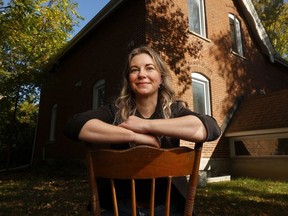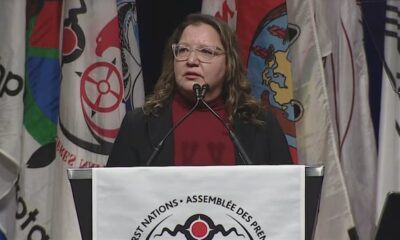Lifestyle
Ottawa Faces Pressure as Federal Hotel Funding for Asylum Seekers Ends

The federal government’s decision to discontinue funding for hotel accommodations for asylum seekers has sparked significant concerns regarding the impact on Ottawa’s shelter system, which is already stretched to its limits. The withdrawal of financial support is expected to shift the costs and responsibilities onto municipalities and non-profit organizations.
Kale Brown, acting director of housing and homelessness services for the City of Ottawa, highlighted that the end of this funding “will likely have a negative effect on Ottawa’s shelter system, which is already overburdened and at max capacity.” Recent statistics reveal that as of April, **708 families** relied on hotels and transitional housing, with approximately half being newcomers to Canada, according to Kaite Burkholder Harris, executive director of the Alliance to End Homelessness Ottawa.
This situation poses a considerable financial strain on municipal resources. Burkholder Harris remarked, “Other levels of government have to step up,” emphasizing the need for collaborative efforts to address the escalating challenge.
Non-profit organizations expect to face increased demands on their programs as well. Kailee Brennan, executive director of Matthew House Ottawa, which supports refugee claimants, noted the limitations of hotel accommodations. “Offering hotel rooms is expensive and doesn’t provide wraparound supports that will result in long-term success for newcomers,” she explained. Brennan added that eliminating this option without providing alternatives will exacerbate the existing pressures on the system.
Federal Funding History and Future Prospects
Immigration, Refugees and Citizenship Canada (IRCC) has funded hotel accommodations since **2017**, initially as a temporary measure to alleviate pressure on local shelters. Julie Lafortune, an IRCC spokesperson, stated that this transition marks the end of hotel use and a shift in focus towards sustainable long-term housing solutions. The **Interim Housing Assistance Program (IHAP)** has allocated approximately **$1.5 billion** to help cover emergency housing costs associated with rising numbers of asylum claimants. The recently announced **2024 budget** includes **$1.1 billion** to extend IHAP for an additional three years.
Lafortune further clarified that all claimants currently housed in Ottawa hotels were expected to secure new accommodations by **October 1, 2023**. The IRCC, in collaboration with the City of Ottawa, has worked diligently to connect these individuals with housing and provide necessary supports, including case management and landlord referrals.
Despite these efforts, the need for transitional housing remains critical, particularly for families led by single mothers. Brown expressed hope that the IRCC would provide adequate funding for temporary accommodations tailored to the needs of asylum claimants. The city has also expanded its capacity for permanent transitional housing, acquiring the St. Joseph transitional housing program for **$11 million**, which serves about **150 newcomer singles**.
In addition, the **230 Queen St.** site, a successful conversion from office space to transitional housing, accommodates approximately **140 homeless singles** and has been recognized as an innovative solution to the housing crisis.
Challenges Ahead for Asylum Seekers
Despite recent expansions, neither St. Joseph nor the Queen St. location offers transitional housing for families. To address this gap, the city has launched a Request for Offer, seeking proposals for immediate and long-term accommodations suitable for families. Brown noted that a budget has yet to be established, as the city is currently assessing potential sites.
The timeline for readiness of new facilities can be lengthy. Myriam Mekni, executive director of CCI Ottawa, indicated that it typically takes about a year for a new building to be operational, depending on its condition.
The complexities surrounding affordable housing continue to challenge the system. Asylum seekers face difficulties navigating the refugee status process, which is often prolonged. Karen Walker, chair of the subsidy committee at OMRA, pointed out that the limited financial assistance available under Ontario Works poses significant challenges. A single asylum seeker qualifies for just **$390** a month for rent, alongside **$343** for other needs, totaling **$733** monthly. With housing costs in Ottawa often exceeding **$800** to **$900** for even a room in a shared house, many face dire circumstances.
Asylum seekers also do not qualify for several benefits until they gain “protected person” status, further complicating their situation. Walker warned, “I think a lot of them will end up on the street,” highlighting the urgency of addressing these gaps in support.
The funding landscape comprises a mix of federal, municipal, and provincial resources, often supplemented by charitable contributions. A report from the Association of Municipalities of Ontario revealed that municipal contributions accounted for **51.5 percent** of total funding for housing and homelessness.
Toronto Mayor Olivia Chow has echoed concerns about the fiscal implications of ending federal support for hotel accommodations, cautioning that residents may face higher taxes or an increase in homelessness if alternative funding is not provided.
Community-based housing options have proven to be more cost-effective and yield better long-term outcomes compared to hotels. For instance, Matthew House costs approximately **$37** a day for a single person, and a survey of former clients indicated that **94 percent** had not returned to a homeless shelter since their stay.
Brennan expressed optimism about Ottawa’s commitment to sustainable community-led solutions, stating, “Hotels are a Band-Aid on a bullet wound.” She emphasized the need for a collaborative approach among all levels of government to ensure effective use of taxpayer dollars.
As the situation evolves, the city continues to seek solutions to accommodate the needs of asylum seekers and prevent further strain on the shelter system. The urgent dialogue surrounding these issues is essential, as the well-being of some of the most vulnerable members of society hangs in the balance.
-

 Politics4 weeks ago
Politics4 weeks agoSecwepemc First Nation Seeks Aboriginal Title Over Kamloops Area
-

 World5 months ago
World5 months agoScientists Unearth Ancient Antarctic Ice to Unlock Climate Secrets
-

 Entertainment5 months ago
Entertainment5 months agoTrump and McCormick to Announce $70 Billion Energy Investments
-

 Science5 months ago
Science5 months agoFour Astronauts Return to Earth After International Space Station Mission
-

 Lifestyle5 months ago
Lifestyle5 months agoTransLink Launches Food Truck Program to Boost Revenue in Vancouver
-

 Technology3 months ago
Technology3 months agoApple Notes Enhances Functionality with Markdown Support in macOS 26
-

 Lifestyle3 months ago
Lifestyle3 months agoManitoba’s Burger Champion Shines Again Amid Dining Innovations
-

 Top Stories2 months ago
Top Stories2 months agoUrgent Update: Fatal Crash on Highway 99 Claims Life of Pitt Meadows Man
-

 Politics4 months ago
Politics4 months agoUkrainian Tennis Star Elina Svitolina Faces Death Threats Online
-

 Sports5 months ago
Sports5 months agoSearch Underway for Missing Hunter Amid Hokkaido Bear Emergency
-

 Politics5 months ago
Politics5 months agoCarney Engages First Nations Leaders at Development Law Summit
-

 Technology5 months ago
Technology5 months agoFrosthaven Launches Early Access on July 31, 2025





















